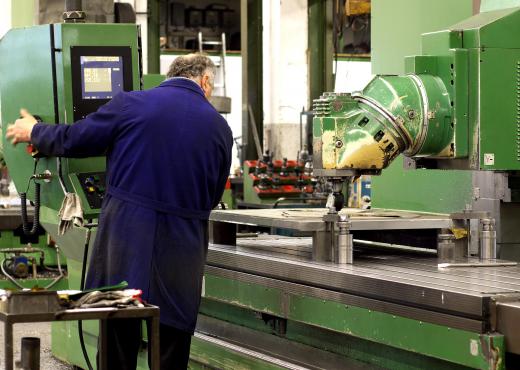What is Rehabilitation Engineering?
Rehabilitation engineering refers to the development, design, and application of rehabilitation technology. Engineers that work within this field attempt to find ways to assist disabled people by providing a technological solution to everyday problems. Customized rehabilitation equipment — including specialized walkers, hearing aides, and other devices — are generally created by rehabilitation engineers.
Rehabilitation engineers spend most of their time designing orthotic, mechanical, electronic, and assistive objects. All of these items are then used to help people cope with specific disabilities. Rehabilitation engineering facilities often create specialized equipment according to a client's needs. The main purpose of a rehabilitation engineer is to make a person's quality of life better by designing specialized equipment. These engineers can work in hospitals, clinics, or independently.

Frequently, mass-marketed rehabilitation products do not fit the needs of many individuals -- in this case, one size does not fit all. As a response to this dilemma, rehabilitation engineering works towards creating specialized products for each person. Thus, through a thorough evaluation, a rehabilitation engineer can modify an existing product, or create a new product according to a person's needs. Any person in need of specialized rehabilitation equipment can usually benefit from rehabilitation engineering. In order to obtain a uniquely engineered product, disabled people must meet certain eligibility requirements.

These requirements differ drastically depending upon the type of health facility that offers rehabilitation engineering. While some facilities will offer help to any patient that needs it, other facilities may have certain set criteria. Regardless, anyone being considered for an engineered product must go through an extensive examination.
While this type of evaluation can vary, rehabilitation engineers generally look for two things during each evaluation. The first thing that an engineer will note is whether or not a patient can, in fact, benefit from a specialized product. Secondly, the product that a patient is currently using must be insufficient. In short, rehabilitation engineers will not consider a patient who has a perfectly effective product. The effectiveness of a product is determined through a series of intense tests.
Without rehabilitation engineering, people struggling with a disability would have to cope with mediocre rehabilitation equipment. This type of engineering exists in most First World countries. If you think that you could benefit from customized rehabilitation equipment, contact your local hospital, clinic, or other health care facility. Alternately, some independent rehabilitation engineering outfits exist. These facilities can be found by conducting a basic Internet search.
AS FEATURED ON:
AS FEATURED ON:












Discussion Comments
@MrMoody - You mentioned price, and that can certainly be prohibitive. However, I have a theory.
Once a new product is developed that is customized for a particular application, it eventually evolves a spinoff product that reaches a wider market.
I know for a fact that happens with space technology. A lot of the stuff that was built for exploring outer space eventually spun off consumer electronics innovations.
So I think the same thing would happen with rehabilitation engineering. These customized applications would lead to new inventions for the mass market, and in my opinion, that justifies the cost of research and development.
@MrMoody - I’m amazed at some of the products they have on the market that enable people with missing limbs to be able to use artificial products so that they can lead normal, healthy lives and function as they did before.
I even saw this case of a woman who’s leg was supposedly paralyzed, but they hooked her up to this device that gave her mobility again. It took some physical therapy rehabilitation to teach her how to use it properly but it works.
I think the technology was used first in the military but it has been adapted to commercial use. I love what’s happening in medical technology nowadays. It’s giving hope to so many people.
Rehabilitation engineering and assistive technology is a wonderful way to use your technical skills to make the world a better place.
However, I’d like to point out the downside to creating a customized product that suits one or only a handful of individuals. It will be very expensive.
That’s why you need to check if your insurance company will pay for the product. Some things like electric mobile wheelchairs are covered by Medicaid, from what I understand, or other insurance programs. But you would certainly want to check to find out.
While the people building the products are doing something beneficial, it’s still a for-profit industry they’re in, and so these things will cost money.
Post your comments